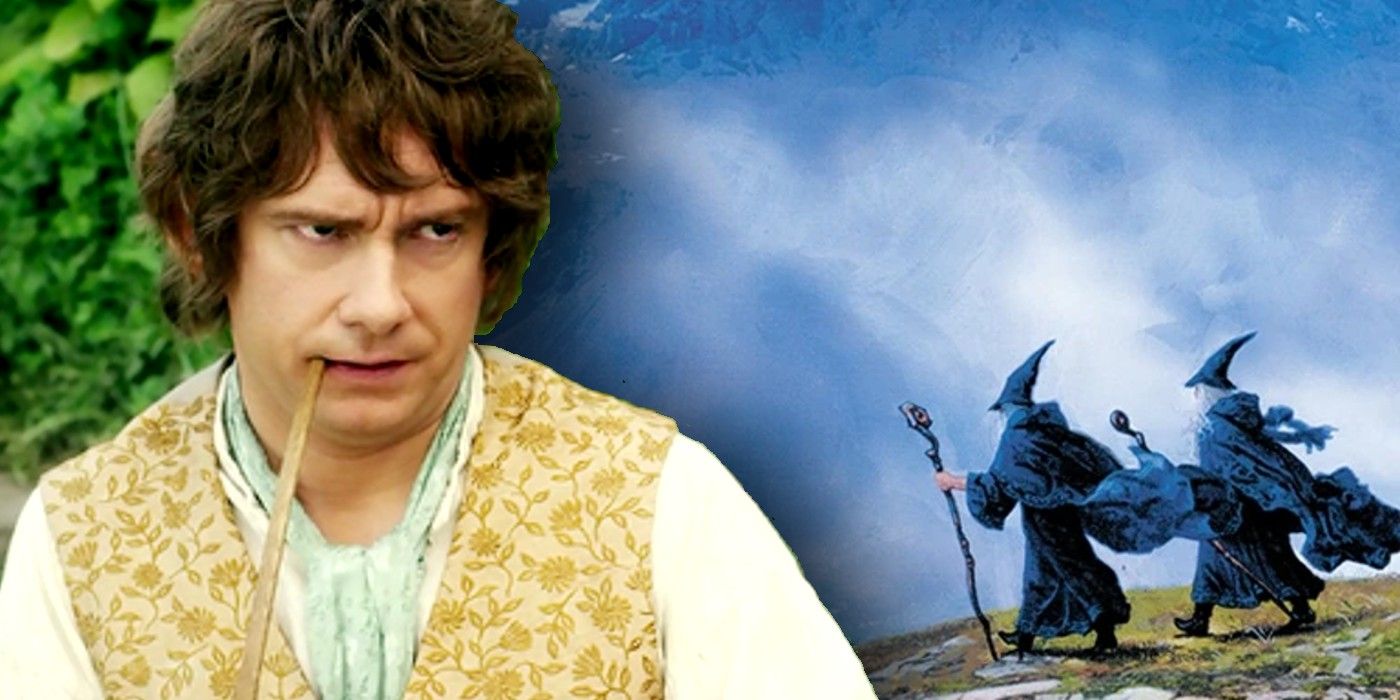Both The Lord of the Rings and The Hobbit dealt with some pretty heavy subject matter. Bilbo Baggins once told his nephew, “It’s a dangerous business, Frodo, going out your door.” And Bilbo was exactly right. Gandalf chose him to go on a dragon-killing adventure, complete with a massive battle between five armies and the heartbreaking loss of several companions. Then, Frodo battled countless foes and endured numerous trials on his way to saving all of Middle-earth from the threat of Sauron and his Ruling Ring. In the process, he suffered wounds and trauma that never truly healed — including the loss of his finger — and ultimately departed Middle-earth to find peace amid the Grey Havens. Tolkien himself was a veteran of World War I, and his experiences there informed his fantasy epic in countless ways, lending it a good deal of tragedy as well as the sad wisdom that some evils never truly die.To balance that dark subject matter, the writers for The Lord of the Rings and The Hobbit movies used some comedic juxtaposition, inserting all kinds of funny, meme-making quips. It helped make the movies engaging and crowd-pleasing without diminishing the weightier side of Tolkien’s tales, as well as showing the characters more or less at ease with each other. It also allowed director Peter Jackson and his cohorts to lend their movies a more contemporary feel and bring in a few cheeky fan-based observations that helped break up the books’ sometimes stodgy reputation. While The Lord of the Rings franchise had numerous comical scenes, the best one was actually written to utilize a legal loophole. Not only does it give the joke an additional wrinkle that knowing fans can pick up on, but it also potentially sheds light on a little-seen corner of Tolkien’s magical world that could eventually pay dividends for future Middle-earth projects in need of inspiration.Each film in The Lord of the Rings series had its own touch of humor, often based on its connection to the original novels and things they couldn’t elegantly fit into the films. For instance, The Fellowship of the Ring cleverly sent its four hobbits on “A Shortcut to Mushrooms,” just like a notable chapter title in the books, complete with the characters voicing the phrase shortly before their first terrifying encounter with the Ring Wraiths. On a far cheekier note, the movies periodically allude to the Hobbits’ pipe weed being closer to marijuana than tobacco. Gandalf’s periodic lapses in memory are attributed to his fondness for smoking, and the film version of The Return of the King opens with Pippin and Merry greeting Gandalf’s party while giggling under the effects of Saruman’s pipe weed. Tolkien himself would never have made such references — oblique or otherwise — but they cropped up among the fan base during the psychedelic 1960s. Ballantine Books released a second printing of the trilogy in 1965 that skyrocketed to the top of the bestseller list, elevating their profile tremendously and making them a staple of U.S. counterculture at the time. The film uses the Hobbits’ fondness for smoking to jokingly reference that part of the novels’ history.
Both The Lord of the Rings and The Hobbit dealt with some pretty heavy subject matter. Bilbo Baggins once told his nephew, “It’s a dangerous business, Frodo, going out your door.” And Bilbo was exactly right. Gandalf chose him to go on a dragon-killing adventure, complete with a massive battle between five armies and the heartbreaking loss of several companions. Then, Frodo battled countless foes and endured numerous trials on his way to saving all of Middle-earth from the threat of Sauron and his Ruling Ring. In the process, he suffered wounds and trauma that never truly healed — including the loss of his finger — and ultimately departed Middle-earth to find peace amid the Grey Havens. Tolkien himself was a veteran of World War I, and his experiences there informed his fantasy epic in countless ways, lending it a good deal of tragedy as well as the sad wisdom that some evils never truly die.
To balance that dark subject matter, the writers for The Lord of the Rings and The Hobbit movies used some comedic juxtaposition, inserting all kinds of funny, meme-making quips. It helped make the movies engaging and crowd-pleasing without diminishing the weightier side of Tolkien’s tales, as well as showing the characters more or less at ease with each other. It also allowed director Peter Jackson and his cohorts to lend their movies a more contemporary feel and bring in a few cheeky fan-based observations that helped break up the books’ sometimes stodgy reputation. While The Lord of the Rings franchise had numerous comical scenes, the best one was actually written to utilize a legal loophole. Not only does it give the joke an additional wrinkle that knowing fans can pick up on, but it also potentially sheds light on a little-seen corner of Tolkien’s magical world that could eventually pay dividends for future Middle-earth projects in need of inspiration.
Each film in The Lord of the Rings series had its own touch of humor, often based on its connection to the original novels and things they couldn’t elegantly fit into the films. For instance, The Fellowship of the Ring cleverly sent its four hobbits on “A Shortcut to Mushrooms,” just like a notable chapter title in the books, complete with the characters voicing the phrase shortly before their first terrifying encounter with the Ring Wraiths. On a far cheekier note, the movies periodically allude to the Hobbits’ pipe weed being closer to marijuana than tobacco. Gandalf’s periodic lapses in memory are attributed to his fondness for smoking, and the film version of The Return of the King opens with Pippin and Merry greeting Gandalf’s party while giggling under the effects of Saruman’s pipe weed. Tolkien himself would never have made such references — oblique or otherwise — but they cropped up among the fan base during the psychedelic 1960s. Ballantine Books released a second printing of the trilogy in 1965 that skyrocketed to the top of the bestseller list, elevating their profile tremendously and making them a staple of U.S. counterculture at the time. The film uses the Hobbits’ fondness for smoking to jokingly reference that part of the novels’ history.
#Lord #Rings #Funniest #Scene #Legal #Loophole
Note:- (Not all news on the site expresses the point of view of the site, but we transmit this news automatically and translate it through programmatic technology on the site and not from a human editor. The content is auto-generated from a syndicated feed.))



